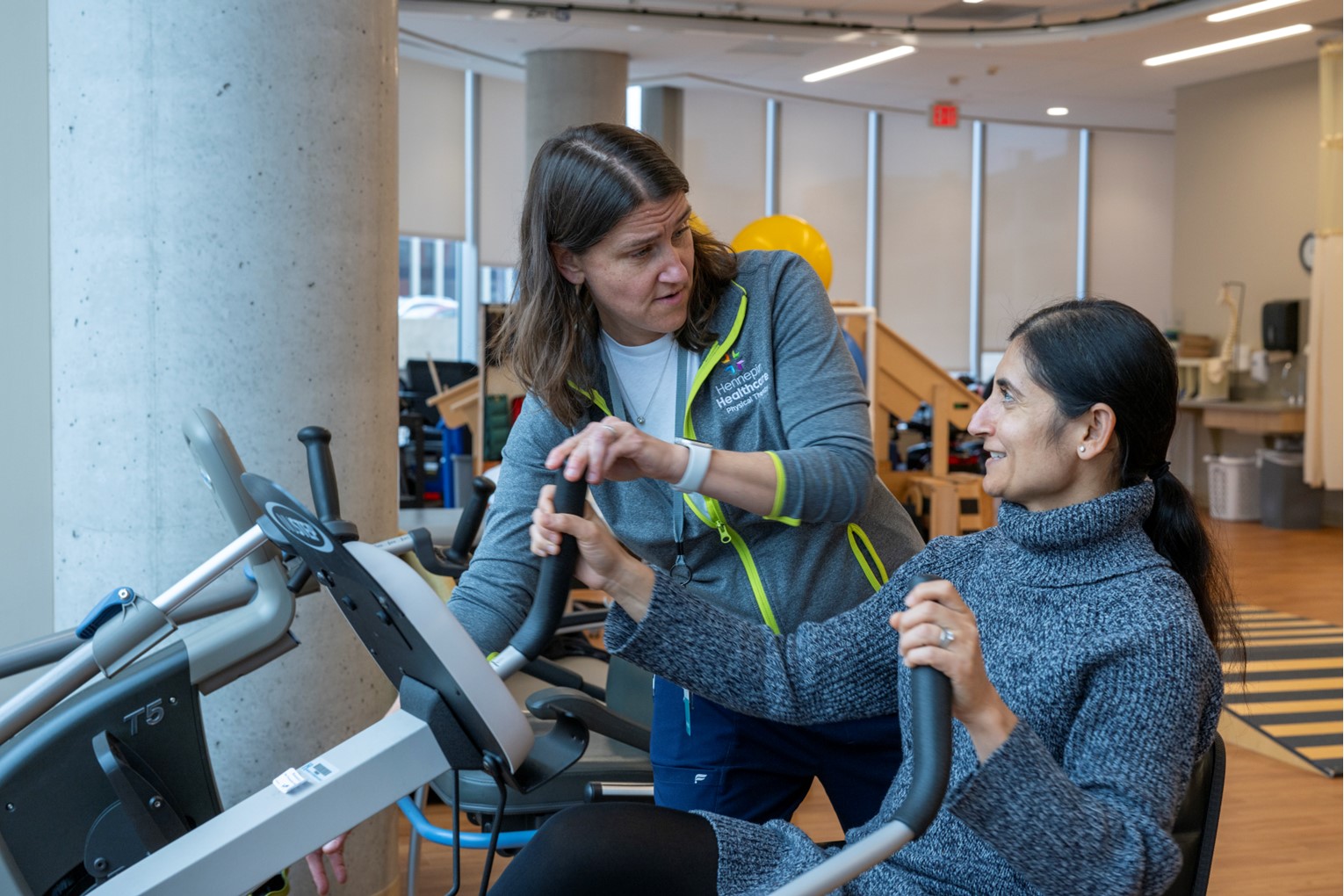
Rehabilitation After a Traumatic Brain Injury
Hennepin Healthcare excels in all aspects of rehabilitation and the expert care our team offers following a traumatic brain injury is no exception. Providers from many different areas and specialties make up our care teams.
Patients may be seen as an inpatient (hospitalized) or outpatient depending on the severity of injury. For those patients who are hospitalized with a brain injury, rehabilitation begins in the hospital as soon as the patient's overall condition is stabilized, often within 24 to 48 hours after the brain injury. The Knapp Rehabilitation Center is a leader in inpatient rehabilitation for adults and adolescents with brain injuries. The Brain Injury Outpatient Program at Knapp is accredited by The Commission on Accreditation of Rehabilitation Facilities (CARF).
Rehabilitation helps those who have suffered any degree of brain injury to relearn skills that are lost when part of the brain is injured. It also teaches new skills to accommodate any that were lost or need to adapt. The goal of a custom rehabilitation plan is to help the patient blend back into the community.
The type and length of rehabilitation varies from person to person. On an inpatient and/or outpatient basis a patient with a brain injury may need one or more of the following therapies.
Physical Therapy
Physical therapy following a brain injury may consist of:
- restoring physical functioning for mobility required for the home, community and work settings
- treating loss of movement and pain
- improving strength, balance, coordination and overall fitness
- assessing wheelchair, walking aide and orthotic needs including fit and training
- operating assistive devices (walking aides or other equipment if needed)
Occupational Therapy
Occupational therapy can help with:
- neurovision rehabilitation training which includes teaching the eyes, brain and body to work together to improve common symptoms including dizziness, nausea and headaches. These changes can impact the ability to read, drive safely or tolerate being in a busy environment
- improve cognitive skills including memory, problem solving, safety and judgment
- basic daily living skills such as personal hygiene and grooming, dressing and eating
- higher level daily living skills including medication management, money management, meal preparation, return to school and/or work and return to driving
- adaptive equipment usage to help with dressing, using bathroom equipment, cooking, etc.
- improving home and community safety through assessment and modification of environments and activities to facilitate well-being and independence
- physical changes such as strength, coordination, endurance, tone and sensation
Speech-Language Pathology
Speech-language pathology may help patients with:
- cognitive or 'thinking' deficits in higher level attention, memory, working memory, new learning (for vocational or academic settings), problem solving, organization, planning and reasoning
- linguistic or 'language based' deficits in auditory processing, complex listening comprehension, reading comprehension, reading efficiency, language formulation and 'word finding,' and writing, including specific styles of vocational or academic writing
- pragmatic or 'social communication' deficits
- non-medical management of common TBI symptoms using cognitive-communicative strategies such as minimizing distractions, pausing or writing things down to remember
Neuropsychology
Neuropsychology may be needed to:
- evaluate and develop a treatment plan for cognitive problems related to thinking, memory, concentration and sequencing
Social Services
Social work services may help with:
- identifying programs and resources in the patient's community to support the patient and family
- navigating financial resources and programs (disability insurance through employers, social security programs, medical assistance eligibility, etc.)
- housing resources or living situation issues
- transportation resources / program eligibility (Mnet, metro-mobility, etc.)
- referrals to the Minnesota Brain Injury Alliance programs
- referrals to vocational rehabilitation programs
- providing general counseling and advocacy for patients
- educating patients, family members, employers and educators about traumatic brain injuries and helping them understand and support the patient
- Return to Learn – the social worker is a liaison between TBI clinic providers and school staff when the patient goes back to school
- Return to Work – the social worker assists with documentation / form completion and comprehension when the patient goes back to work

